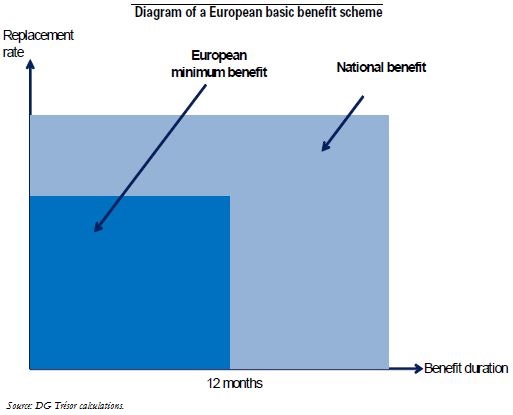Trésor-Economics No. 132 - An unemployment insurance scheme for the euro area
Pooling a part of unemployment insurance within the euro area would provide a new instrument for solidarity that would in turn be a concrete incarnation of the social dimension of EMU while enhancing stabilisation of the euro area as a whole. The crisis made it clear that the euro area has no central fiscal instrument that is able to cushion the impact of macroeconomic shocks. Setting up a common unemployment insurance scheme would be an ambitious response to this situation that would send a strong political message to citizens, with structural implications for the integration of the euro area.
This instrument could take the form of a common basic benefit scheme, in view of the widely differing principles that govern national unemployment benefit schemes. This common basic benefit scheme could, for example, provide those who have been out of work for up to one year (the most cyclical component of unemployment) with benefits worth 50% of their previous wage. Financing for the scheme could be levied on a harmonised tax base, such as the total wage bill. The basic benefit scheme could be topped up by a national benefit in accordance with the preferences of each Member State, thus ensuring the same level of unemployment benefits as today while preserving the prerogatives of national social partners.
To reduce the risk of moral hazard stemming from the temptation to benefit from the scheme without trying to reduce structural unemployment, their initial contributions to finance the common basic benefit scheme could be calibrated to ensure fiscal neutrality, with no lasting transfers between countries in the medium term. Individualised contribution rates based on each Member State's unemployment rate, updated periodically based on past trends, would ensure ex ante fiscal neutrality between Member States. In the interval between two updates, joint debt issuance to cover the potential cash requirements of the common scheme would enhance stabilisation capacity.
In the longer term, and after some convergence of the different Member States' unemployment rates, a scheme featuring greater solidarity between Member States could be considered with funding based on a single contribution rate. To prevent moral hazard, such a scheme would require greater coordination of employment and labour market policies, with the close involvement of European social partners. Such an arrangement would require a greater degree of solidarity and transfers between countries than that needed solely for the purposes of business cycle stabilisation.
